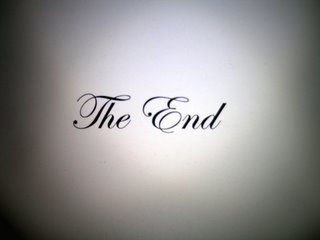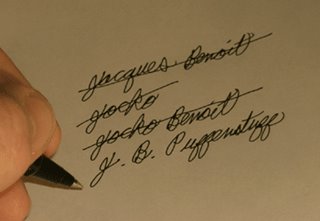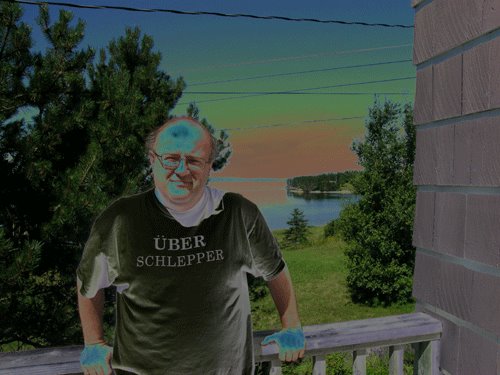
One thing that Hollywood is often criticized for is the ‘Hollywood ending.’ You know – the heroic triumph, the guy kissing the girl, violins swelling, broad horizons opening up in front of our protagonists. But all Hollywood movies are not, thank God, made the same. With this in mind, I’ve put together a list of some of my favorite film endings – many of which will illustrate my point.
Many others before me have noted that an ending can make or break a movie. Both cases are certainly true. A movie-ruining bad ending can leave you feeling cheated. Such is the case with M. Night Shyamalan’s
The Village. Meanwhile, a so-so movie, let’s say
Pitch Black, can almost be redeemed by a great ending. And a good movie with a good ending is often award-winning material. But there are also many movies that are quite good and fizzle in the final seconds – like
Wall Street. The final scene where our young inside trader gets out of the car and heads up into court feels unsatisfying. But the movie is still good enough that we can forgive a lapse of intensity in the dying moments. So a film’s ending isn’t absolutely everything.
What endings are about is giving the viewer a sense of satisfaction – both of the aesthetic and the moral variety. I say moral because I remember when
The Talented Mr. Ripley came out I spoke to many people (mostly women, as it turned out) who absolutely hated the movie and really really hated the ending where the young Mr. Ripley gets away with murder on more than one occasion and caps everything off by killing his only true love. Interestingly, this ending almost makes my top ten movie endings list. I loved the fact that precisely because he has to kill his only true love to conceal his true identity and then go on to pretend to be in love with a woman while he is gay is one of the most bitter and harsh forms of justice I can imagine. In order to remain free, he has to be someone else. But not everyone agrees. And a film that fails to fulfill our need for artistic and moral symmetry will have a rough time.
But before you go any further, you should know that I’m going to be talking in detail about the endings of ten films, some of which you may not have seen. This will ruin some of these films for you. I don’t want to be the type of person who asks you if you’ve seen a movie and before you can answer tells you how shocking the ending was when the old woman turns out to be a werewolf. Or like the guy who came out of the movie
Jagged Edge and told everyone in our lineup going in, “It’s his typewriter.” Or the guy who drove by a lineup for
Armageddon and screamed out to us, “Bruce Willis dies!” But, then, if you haven’t seen those movies, I’ve already done the damage. Sorry.
A final point: in picking my top ten endings, I cheated. I’ve chosen the very final moments of some films – the dénouement – and from others I’ve chosen the climactic moment, the turning point where something is revealed. If you’d like your money back, talk to the cashier. Anyway, here they are:
10.
The Sixth SenseI hesitate to put this film in here at all because I don’t want to encourage Mr. Shyamalan to keep making movies that try for shocking revelations in the final reel. But when the technique works, it can change your entire sense of what has come before. When Malcolm Crowe realizes that he is actually dead and that he, not only the kid who’s afraid of the dead people that come to him, has also been rescued as the kid has helped him work through his fear of giving therapy, it’s a revelation. The film shows us in its ending that the healing in a therapeutic relationship flows both ways. Besides, the ending forces you to watch the movie again and see where you were misled at every possible turn. That’s only good Hollywood money-making sense.
9.
The Thing (1982)
Okay, this film will never crack my top 100. Sure, John Carpenter’s music is always nifty, and Kurt Russell is in fine post-Snake Plissken form. But the effects veer between startling and creepy-funny (remember the head on tiny bug legs?). And the story itself isn’t all that interesting, although there are some legitimate scares here and there. But the last line of the film is probably my favorite last line ever. Picture the utterly destroyed Antarctic science station, flames rising high into the sub -60 night. Our protagonist McReady and another last survivor, Childs, sit across from each other with a bottle of booze, both of them knowing that there is no hope of rescue and that even if there was hope maybe they shouldn’t be rescued just in case, because one or the other or neither or both of them might be infected by The Thing and ready to spread to the rest of the human population. Childs asks, “What do we do?” and McReady answers, “Why don’t we just wait here for a little while – see what happens?” And then they each take a swig from the bottle. It’s the ultimate ‘guy’ ending. Bring it on, alien.
8.
One Flew Over the Cuckoo’s Nest…Also known as one of the hardest films I can possibly watch to the end. After Chief realizes that the rebel McMurphy has been given a lobotomy for his disruptive behaviour (just when McMurphy was so agonizingly close to leaving the place and never coming back), he smothers his friend with a pillow and then busts out of the asylum. This ending is the ultimate statement about what the system will do to the free spirit, reflecting the essence of Beat writer Ken Kesey’s book and, simultaneously, the post-70’s disappointment in the Boomer generation’s failure to change the system. I would argue that the film and its ending transcend the period in which they were made and have become iconic for the both the defeat and the survival of the free spirit ever since. And I must be right because they parody the moment on The Simpsons.
7.
Falling DownThis film is on the list because of one moment during the climactic confrontation where a police detective with no will to resist his wife or his colleagues has to face a man who has finally found his guts and has been spending the day standing up for himself while gathering a small cache of guns and occasionally exploding in violence. D-FENS, his license plate number – the name we come to know him by – has confronted a surly Korean store owner, gang members, an Aryan supremacist and others in his odyssey through the city as he finally expresses himself and descends into… is it insanity or near-insanity? It’s an open question because when the film was originally released, viewers were split on whether or not this character was sympathetic. But for those who found D-FENS’ situation compelling, we are finally reminded, as he is at the end of the film, that he has become somebody quite different from who he started out as. Det. Pendergrast tells him that he was going to kill his wife and little girl and then himself. And D-FENS pauses and almost soulfully asks:
D-FENS: I’m the bad guy?
Det. Pendergrast: Yeah.
D-FENS: How did that happen?
As we have been watching him throughout his day and he has acted out our own frustrations and aggressions, this near-to-final moment is a reminder to us of how slippery the slope of ‘self-expression’ can be. Meanwhile, Pendergrast, forced to kill D-FENS, absorbs some of the man’s uppitiness and stands up for himself against his wife and his commanding officer with a much more reasonable amount of forcefulness. The proper balance is restored. Almost a Taoist observation about the proper use of force.
6.
Dead Poets SocietyFor many an English teacher, this film has been either inspiring or controversial and potentially dangerous. As a former English teacher myself, I’ve heard both sides often. And the ending of the film really brings both ways of looking at the film into sharp contrast. After inspiring his students to live life to the fullest in the midst of a repressive boys’ school environment in late 50’s America, John Keating is forced to resign when one of his students commits suicide after following Keating’s advice to pursue his passion for acting -a decision which provokes the boy’s father to send him to a military academy. Many teachers feel that Keating’s advice crosses the line of what a teacher can do – especially in the environment of the modern school system where teachers’ actions and words are sharply circumscribed. At the very end of the film, the future poet among Keating’s ‘disciples’ stands up and calls out “O captain, my captain” (quoting the Whitman poem Keating had earlier quoted to the boys), leading many of the boys to stand on their desks. Some people (ok, me too) might be brought to tears by the moment while others see this scene as a contradiction to the earlier scenes where Keating advises the boys to be individuals. Here, instead, they have become loyal ‘troops.’ I can see that, and I don’t care. The fact is, those who feel uneasy about the film react in a remarkably similar manner to the administration of the fictional school. The idea of a teacher not following curriculum and instead giving life advice to students is completely irresponsible to many. But for anyone who pays close attention in school, education isn’t about learning things, it’s about learning to emulate people you admire while you construct your own identity. John Keating, then, is as good a model as any. And even though I’ve never warmed to Whitman, I’m usually standing on my couch by the end of the film.
5.
High NoonMarshal Will Kane has a problem. At noon, the train carrying men who have promised to kill him is arriving. His wife, his deputies and the town have all abandoned him and it looks like he will have to face the bad guys on his own. He manages to defeat them, with the help of his Quaker wife, and then faces the town at the end. He takes off his badge and throws it at their feet in the dirt before riding off with his new bride. It is a scene that warms my sometimes anarchist heart. The town order is restored, as in so many Westerns, but we don’t care. The hero rides off, but he gets the girl. A couple of common conventions are defied here. And screenwriter
Carl Foreman gets to take a sidelong swipe at the
House Un-American Activities Commission and his friends who abandoned him during the time when he was subpoenaed to testify about Communist members of Hollywood. He refused and, like many of the time, had little support. The image of a Marshal tossing his badge to the ground in contempt, though, resonates beyond that moment in American history. And it’s the kind of thing you don’t expect to see in a Hollywood Western.
4.
Fight ClubThe important thing in Fight Club is that the guy gets the girl – the Hollywood ending, right? Only if you like wearing nothing but black (face mask included) and show up frequently at anti-W.T.O. rallies. The beauty of the final moment is that our hero rids himself of his Tyler Durden doppelganger by shooting himself. But will he make it to the credit card company hi-rises that have been wired to blow? Maybe in another movie he might. But here he just has enough time to console Marla, his on-again off-again girlfriend (depending on whether he is himself or Tyler) by saying, “Everything’s going to be fine.” And that’s when the explosions rip through the buildings across the way. The buildings begin to fall in a fireworks of destruction as the two lovers reach for each other’s hands and our narrator says, “You met me at a very strange time in my life.” And they go back to watching the pyrotechnics in what would have to be described as the most romantic moment ever for anarchists. Sorry – I’m trying not to cry as I write this.
3.
The TerminatorAgain with the violence and destruction, right? Not quite. Actually another tender moment, of sorts. Sarah Connor, the pregnant mother of the future rebel leader who will save mankind from destruction by the machines, has survived the final battle with the terminator and pulls up to a gas station. Just when she thinks about Kyle (the man who dies trying to help her), a boy takes her picture – the same picture Kyle used to look at, wondering what she was thinking of at the time. But then the boy points to the darkening skies and the old man nearby says that a storm is coming in – a symbolic parallel to the real storm that is coming in the future when the robots take over. Sarah knows everything that is ahead – that she will have to struggle and die and watch the slaughter of countless humans. The happy ending has already happened in a sense, but now she has to endure the horrific part of the story. So she drives into the heart of the storm. Thank you time paradoxes and loops for an ending that is both happy and ominous.
2.
MementoThe first time I saw this movie, I kept asking myself, “What would be the worst possible thing that could happen in a story like this? What would be the least optimistic conclusion possible?” And the possibilities I went through in my head fell a little bit shy of the actual ending’s truly dark implications. We only learn at the end of the film (but actually the beginning of this inversely told story) that Leonard Shelby himself is just doing what everyone else has been doing – taking advantage of his lack of long term memories. He sets himself up to kill the closest thing to a friend he has. And if Teddy is telling anything near the truth, the odds are that it was Leonard himself who killed his own wife, and not the mysterious John G. he has been looking for. The story turns out to be about the impossibility of certainty, but even more so about the power of denial and the inability to accept what one has been and done. The implications stretch far beyond the film, of course, to all of us who are, in less obvious ways, memory-impaired and unknowingly altering our pasts to create an acceptable version of ourselves. Are there enough Post-its to help us ever know ourselves and our relationship to those around us?
1.
Pulp FictionWhat many critics like to talk about in regard to this film is the joy of its aimless romp through the articulate and yet seedy underworld. They love its nihilism. They are watching the wrong film. The ending in the restaurant brings the whole film together through Jules quoted passage,
Ezekial 25:17 – a passage which he has altered somewhat from the original. The bits about the weak man, the righteous man and the shepherd, while reflecting the tone of Ezekial, are not part of that passage as written in the Bible. But it does nicely delineate the film for us as a series of redemption stories about a weak man (Vincent), a righteous man (Butch) and a man who is “trying real hard to be the shepherd” (Jules). Jules’ speech to Honey bunny while he holds a gun on him (and on us – that gun is huge on the big screen) still makes me shiver. We think we know how this is going to end, but the moment turns into one of spiritual change once Jules realizes that he himself is “the tyranny of evil men.” It isn’t a highly emotional transformation. But when this Buddha with a Star Model B 9mm. sets that gun down we know everything that is going to happen afterwards and we know it’s the wise decision. So, even though this ending takes place chronologically before the other two stories, Jules’ revelation becomes a vision of not only his future but that of the other characters in the film.
Clearly, these are very personal and idiosyncratic choices. Far from definitive. But you can learn something about a person by closely observing their favorite movie finales. For example, most of these endings have a defiant tone. Also, while I was composing the discussion of the above films I discovered that my top three picks all question the concept of endings itself. In these three films I find satisfaction both in the structural design and in the points the films make about the possibilities for and obstacles to redemption. And even though I get a feeling of completion from these endings, there is also the sense that things simply don’t come to an end – the road goes on past the film itself, in both directions.
This is certainly something I live by and so my favorite film endings simply reinforce what I already believe. Nothing new there. We go to films not to lose ourselves but to find ourselves. In some ways, we try to embody those values – we become the ends of those films as we step back into the light, spoiling for another chance.














